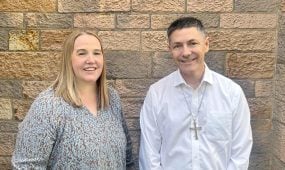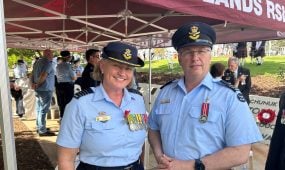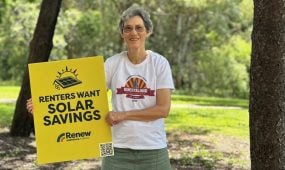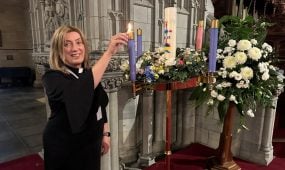Q&A with Brisbane Anglican, Act for Peace CEO and 2019 Queensland Local Hero, Elijah Buol OAM
Spotlight Q&A
Meet the inspiring Elijah Buol OAM and find out about his remarkable faith journey, his recent meeting with Archbishop Jeremy, why the Bible is so special to him, the high school teacher whose kindness changed his life, what makes him nostalgic and his earliest memory
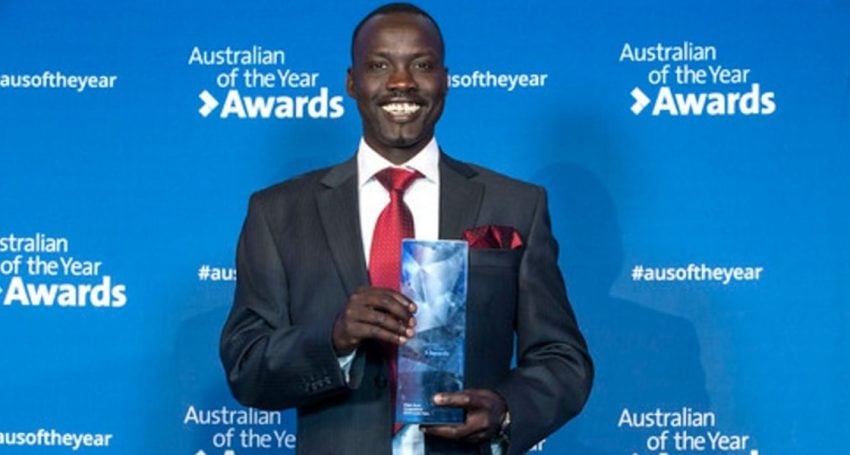
Where do you currently live and where do you worship?
I live in Brisbane’s west, and I worship with community members at The Parishes of Yeronga, Ipswich and Raceview.
How long have you been involved in the Anglican Church and in what roles?
I was born into the Anglican family. My mother was a lay leader in my village of Biong in Bor, South Sudan. Every weekend people would come to our home and preach and talk about the Bible. Mothers gathered on Tuesday’s nights in my home or in the local church to pray. Both my parents died in the Second Civil War. I was six years old when my mum died and in those six years, she raised my four sisters and me emphasising the important of clothing ourselves daily with compassion, care, humility and hope.
What do your roles involve?
I am a believer and go to church and help out when I can. Currently, the main way I serve the Church is through my role as CEO of Act of Peace, which requires a lot of travelling and engagement with Churches around the country. Ashol, my wife, is part of the Yeronga Parish community because she is an Arabic scholar and prefers to worship in Arabic. She has served as a Sunday School teacher and preacher in Egypt and Sudan. We met while worshipping at St Luke’s, Toowoomba in 2006 and our story grew from the church and beyond.
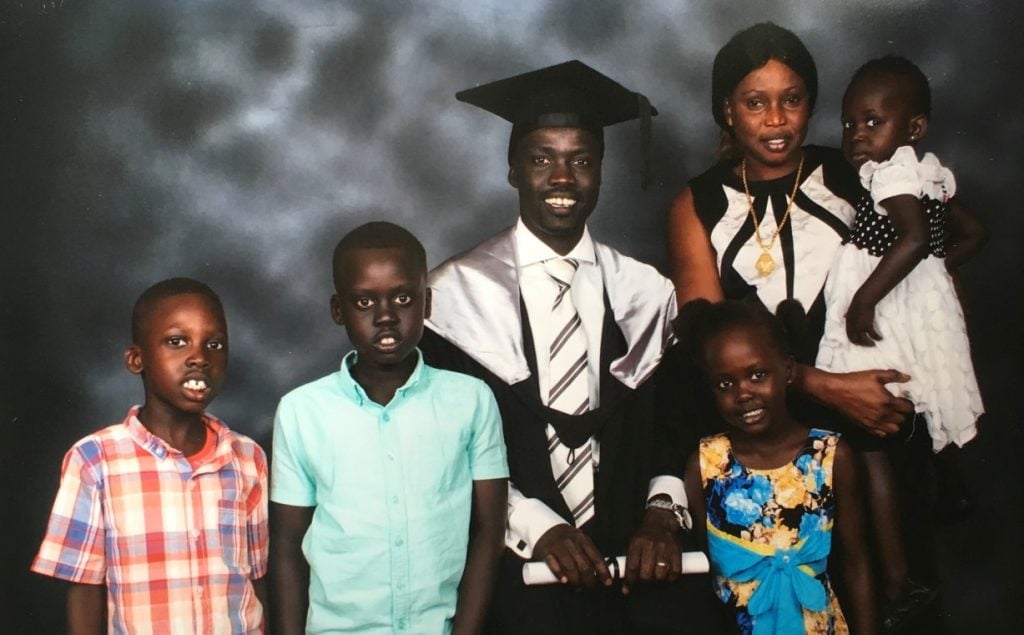
Elijah Buol OAM and wife, Ashol, with children Buol, Deng, Agaw and Yar at Elijah’s Master of Law graduation at QUT in 2017
What has been one of the highlights or best memories of your time as an Anglican?
My best memories are when I was a kid. I grew up in Sunday School, where we did a lot of dancing and singing. My childhood memories celebrating Christmas with marches, dancing, eating sweets and sleeping overnight in the church are precious.
What projects or activities are you currently working on?
Act for Peace is the international humanitarian agency of the National Council of Churches in Australia, which the Anglican Church is a member of. Act for Peace partners with local organisations on the ground assisting people displaced by conflicts, wars and disasters. Our primary project at the moment is raising funds through the Christmas Bowl, which has been going for 75 years. I recently met with Archbishop Jeremy Greaves, and he remembered as a little child contributing to the Christmas Bowl in his church. It was wonderful meeting him in St Martin’s House to chat about being an Anglican and about Act for Peace and the Christmas Bowl.
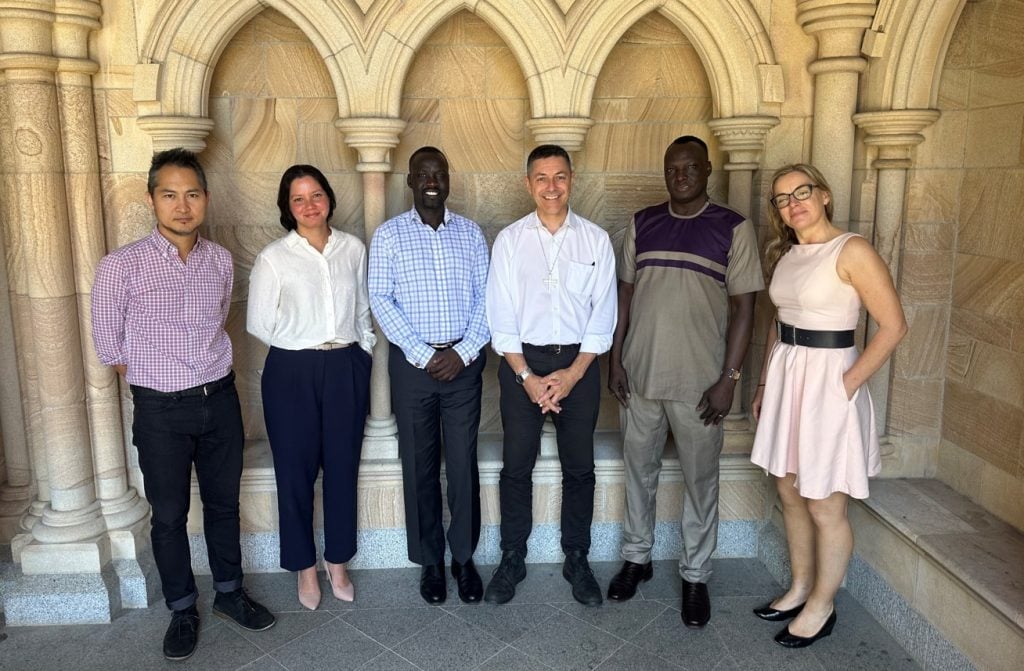
Peter Branjerdporn (ACSQ Justice Unit Coordinator), Trish Manley (Act for Peace Program Manager — Development and Impact), Elijah Buol OAM (Act for Peace CEO), Archbishop Jeremy Greaves, Bishop Daniel Abot and Michelle McDonald (ACSQ Director of News and Community Engagement) met at the St John’s Cathedral Precinct on Wednesday 6 November 2024
This year’s Christmas Bowl funds will assist displaced people and refugees who have fled Gaza and Syria to Jordan and people displaced by earthquakes and flooding in Indonesia and by the drought in Zimbabwe. The money helps to provide electricity, food, water, sanitation and health clinics for families. These people are real people with aspirations, dreams and hopes that can be fulfilled.
The money also helps people rebuild their lives with education and training, so they can start their own businesses, especially food businesses and tailoring. This particularly helps women who can work on their businesses from home as they care for their children.
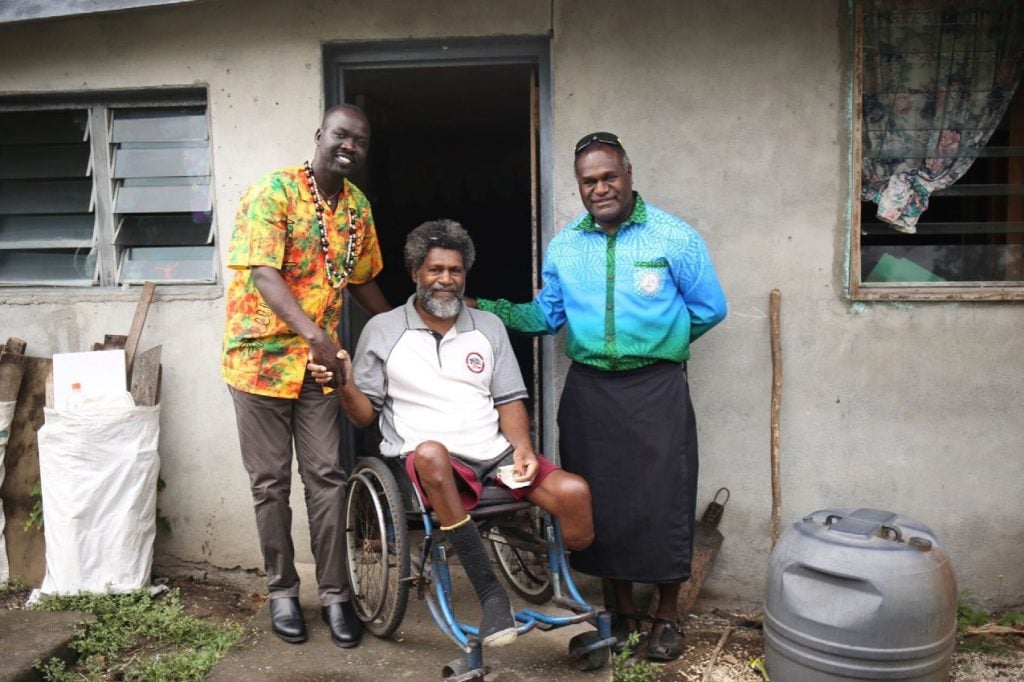
Act for Peace CEO Elijah Buol OAM (left) and Pastor Bernard Yalimyau, the General Secretary of Vanuatu Christian Council (right), meeting with community member Kal (centre) who was evacuated to the VCC Evacuation Centre in Port Vila during the twin cyclones in 2023
When and how did Christmas Bowl start?
The first Christmas Bowl appeared on the dinner table of an Australian Christian family in 1949. Millions of refugees were suffering after World War II in Europe. As The Rev’d Frank Byatt looked at his sumptuous Christmas dinner, the contrast between the abundance he saw and the needs of these refugees seemed stark to him. As a Christian, he felt that he needed to respond.
So, he called on his congregation to “get a bowl to put on your Christmas dinner table as a Bowl of Remembrance and ask if you can get everybody around the table to make a generous gift so that you can share your good dinner with hungry children in other lands.”
That first Christmas Bowl appeal raised £1,808 for refugees. This was a large amount for a congregation at the time. Frank’s idea grew, eventually becoming the Christmas Bowl appeal facilitated by Act for Peace today.
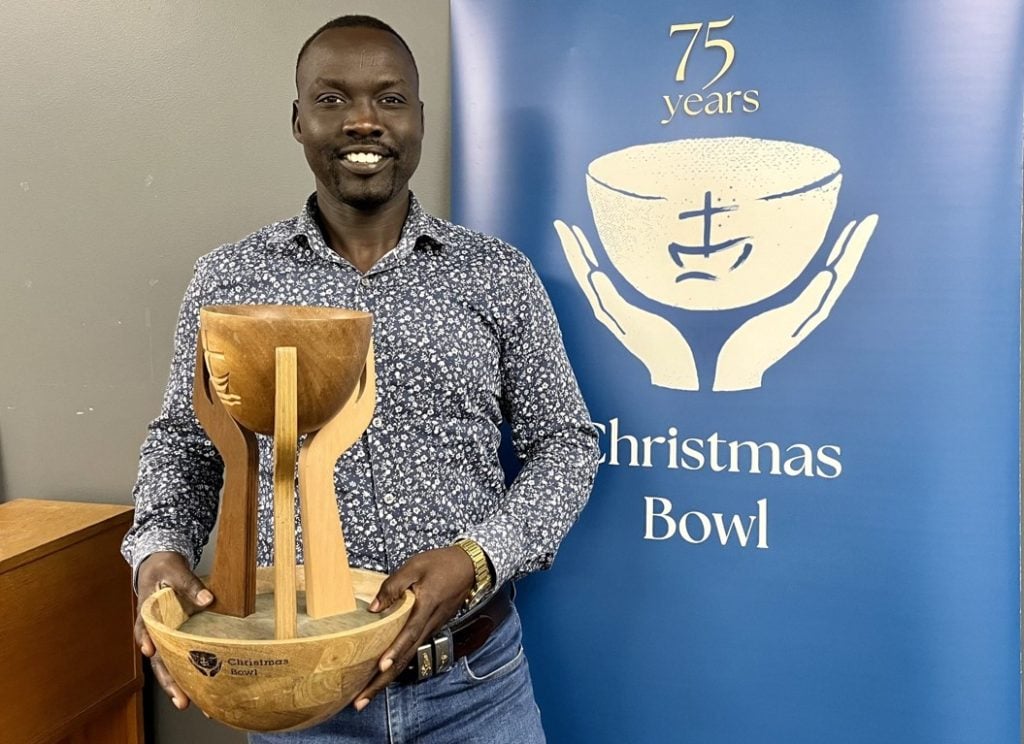
“This year’s Christmas Bowl funds will assist displaced people and refugees who have fled Gaza and Syria to Jordan and people displaced by earthquakes and flooding in Indonesia and by the drought in Zimbabwe. The money helps to provide electricity, food, water, sanitation and health clinics for families,” (Act for Peace CEO Elijah Buol)
What do you like doing most about working for Act for Peace?
Because of my lived experience as a former refugee and being born and raised in a conflict zone, I understand their issues and walk in their shoes. This is what drives my passion for Act for Peace. In my Act for Peace role, every day I strive to help and bring compassion and hope to those who need it.
I was born during a war. It was “normal” for bombs to drop around us and for gunfire to happen around us daily, even as we played. I know what it’s like to live in fear every day. As someone who has experienced being displaced for 10 years, including living seven years in a Ugandan refugee camp, I understand how important hope and a safe place is.
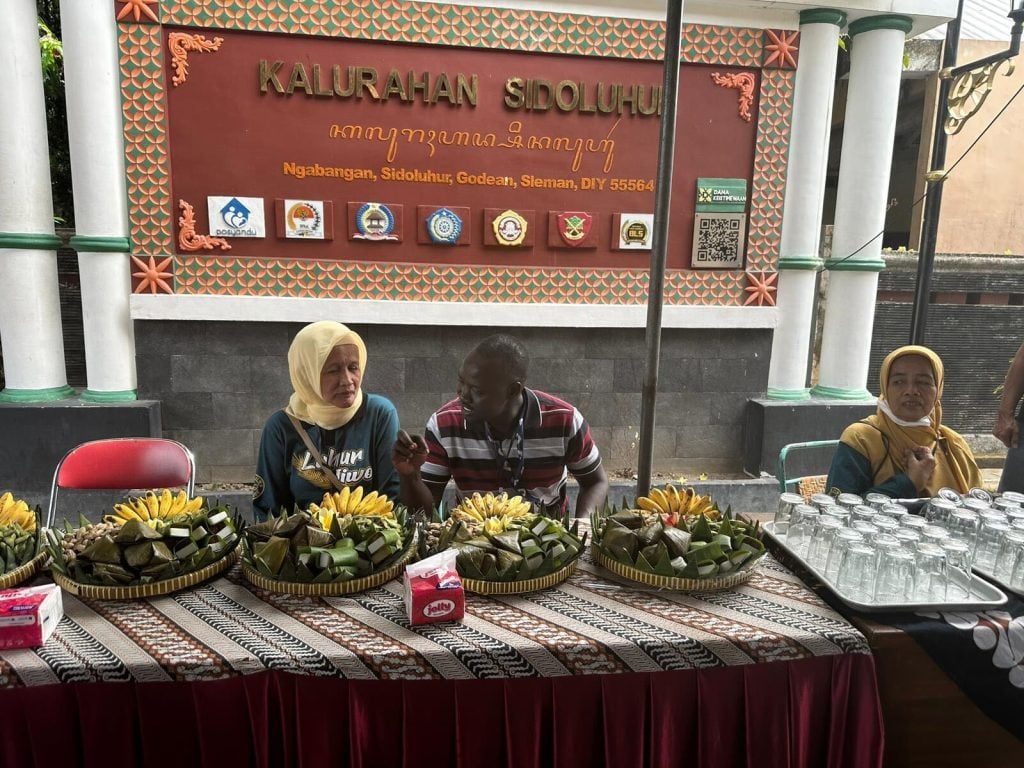
Act for Peace CEO Elijah Buol OAM visiting participants of an Indonesian partner program focussed on climate adaptation and disaster recovery in 2024
Can you tell us a little about your Christian faith journey?
My mum played a critical role in influencing our faith as a family — she showed my dad and us kids what being faithful to God means. I held onto my Bible as I walked to Uganda from South Sudan as a young child. For most of the time I was in the Ugandan refugee camp, I was the only person who spoke Dinka, so reading my Dinka Bible daily kept me connected to both my language and to God.
How does your Christian faith inspire you and shape your outlook?
Jesus teaches us the value of hope and care. Hope is an anchor that has brought me to where I am today. Hope tells us that better days are to come. By relying on the mercy of those who care and by having hope in God, we feel safe and that we belong.
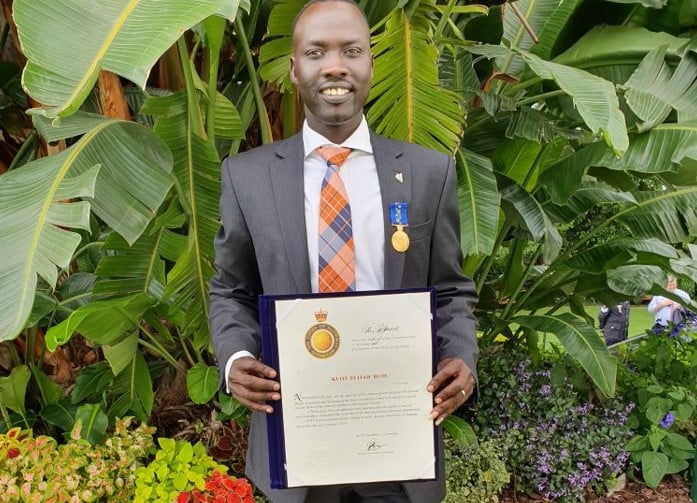
Elijah Buol OAM received his Order of Australia medal from His Excellency the Honourable Paul de Jersey AC Governor of Queensland in 2019 for contributions to the African community in Queensland
What are the primary strengths of the Church and what is the best way to make the most of these for the benefit of our communities?
I think that the Church is the strongest when different denominations work together and stand in solidarity through humanity, such as through the National Council of Churches in Australia. Jesus calls us to be part of one global Church and to act with compassion and share the love and care that Jesus modelled for us. This is our greatest strength — what Jesus calls us to and what he has modelled for us.
What is your favourite Bible scripture and why?
Isaiah 40.31: “But they that wait upon the Lord shall renew their strength; they shall mount up with wings as eagles; they shall run, and not be weary; and they shall walk, and not faint.”
This verse carried me though a two-month journey from my village to the Uganda border when I was eight years old. I walked with thousands of other children and their families to the border to meet United Nations refugee agency lorries so we could be transported to a refugee camp. We mostly walked at night because we had no shoes, and it was common for the temperature to reach 50 degrees. Even though we were totally exhausted and the skin was coming off our feet, we had to walk so we didn’t get left behind. There was a lot of wild animals, including hyena and lions. But this threat was secondary — the primary threats were not having a safe place, enough food and water, diseases like malaria and worrying about soldiers.
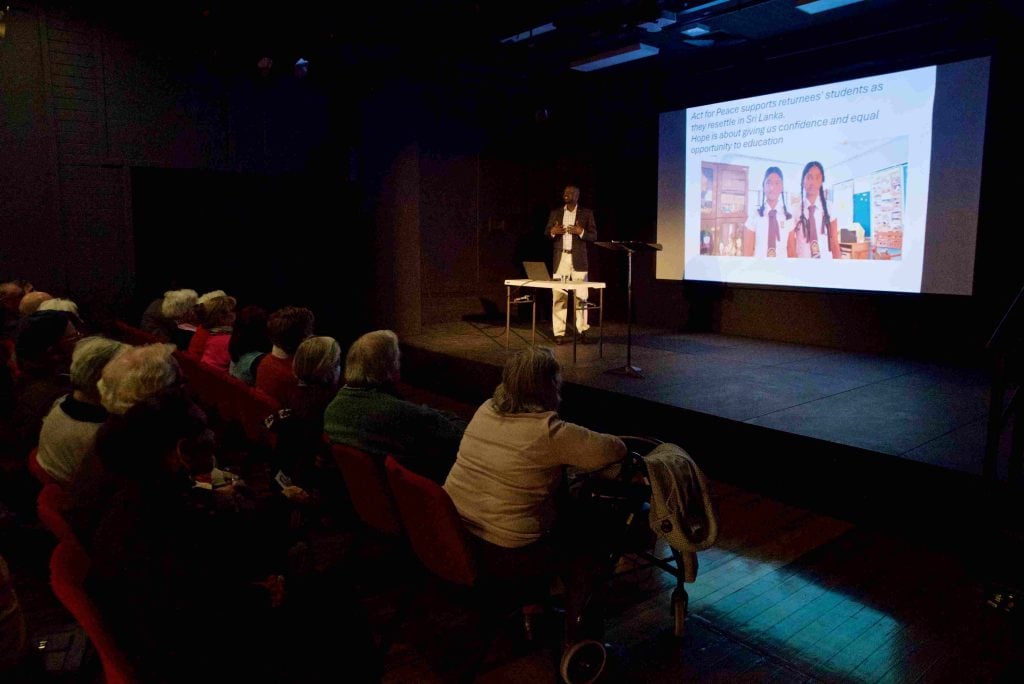
Act for Peace CEO Elijah Buol OAM giving a lecture at a human rights gathering in Armidale in May 2024
What person of faith inspires you the most and why?
As I grew up, I was inspired by our Bishop Nathaniel Garang Anyieth. He is retired now. He visited all of the camps for refugees and internally displaced people, bringing spiritual healing and hope. I met him in 1994 as a member of the Sunday School choir in a camp for displaced people in South Sudan. I could tell he was spiritual. He spoke about the power of hope and forgiveness.
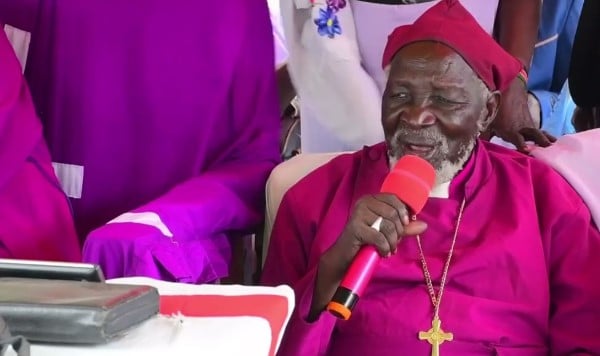
“As I grew up, I was inspired by our Bishop Nathaniel Garang Anyieth. He is retired now,” (Elijah Buol OAM)
Why is it important for Christians to work with Aboriginal and Torres Strait Islander peoples towards Reconciliation?
As an African Australian and a leader, I think it is important for people from the multicultural communities, including the African diaspora, to work towards Reconciliation. As I share my story and journey of healing and hope, I think our healing and belonging will be completed once First Nations peoples are also healed and feel as though they belong through truth-telling and Reconciliation. This year’s Christmas Bowl resource includes an Acknowledgement of Country written by Prof Dr Anne Pattel-Gray, who is well known in our Diocese. She writes: “Imaging an Australia that embraces its First Nations peoples and values them, as they are the oldest living culture in the world.” I think we all have much to learn from elders and experts like Aunty Anne.
What is the kindest gesture you have ever received?
After I arrived in Australia one of my high school teachers, Dr Annette Rutledge, met with me at 7 o’clock every weekday morning before school started to help me with my English. I am still in touch with her. My kids have met her. The Courier Mail interviewed her in 2019 after I became the first immigrant or refugee to be named a Queensland Local Hero.
What is the best piece of advice you have ever received and who gave you this advice?
As a curious and bold little boy, my father told me that I had to leave South Sudan for Uganda to be safe. He told me that I had to find a way to “turn the lemon into lemonade”. That was the last time I saw him — he died as result of the war soon after I reached Uganda.
What do you do in your free time to recharge and relax?
I play soccer, I run and I listen to Gospel music a lot on Sundays. I love my children and love cheering my kids from the sidelines as they run and play sports on the weekend.
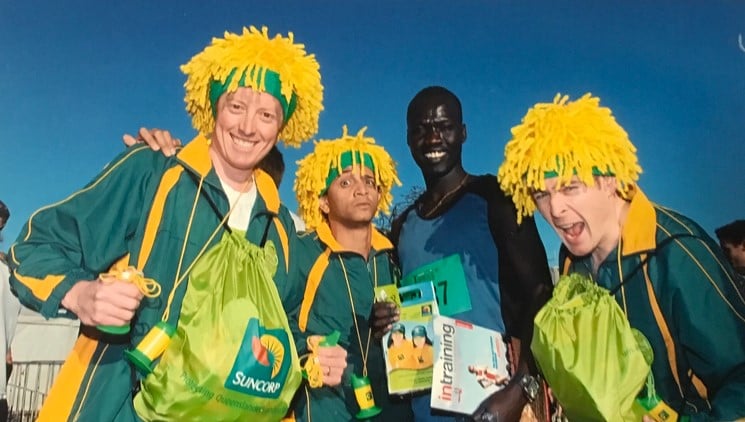
Elijah Buol was joined by three eccentric fans after he won the 10km race at the Suncorp Corporate Games Queensland at UQ in 2006
If you could have a billboard with any text on it, what would it say and why?
“Our next destination in life is not determined by the past steps, but by the steps we take today with hope, courage, resilience and determination.” Life will always throw things our way — challenges and temptations — and we need to turn these into our strengths.
What book have you given away most as a gift and why?
Bringing Out the Best in People: How to Apply the Astonishing Power of Positive Reinforcement by Aubrey C Daniels. This book shows how important it is for people to have positivity in everything they do so they can overcome challenges. We also need to bring positivity into others’ lives — this is partly what being in solidarity with people is about.
When do you do your best thinking?
When I’m reading the Bible and inspirational books.
What’s your best childhood memory?
As well as the Church memories, I remember going fishing using a spear in the creek near the house. I hope to visit there again.
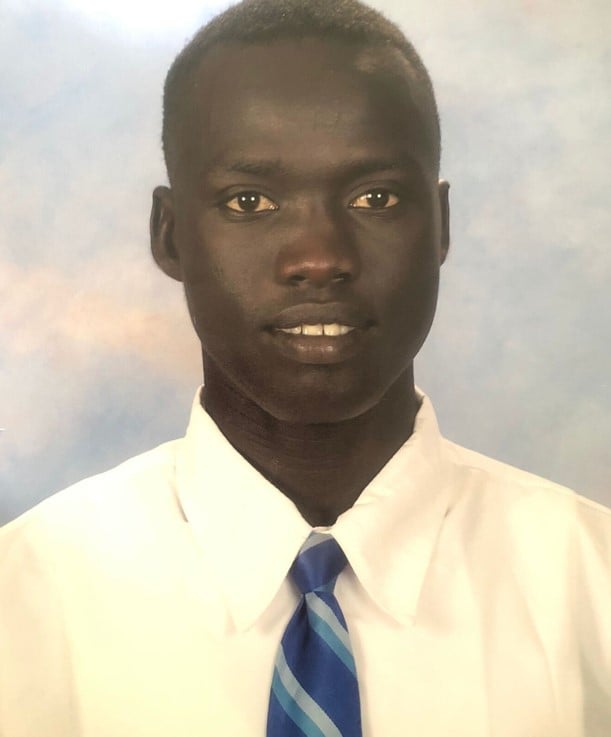
Elijah Buol as a Year 11 student at Coorparoo Secondary College in 2004
What is your karaoke go-to song?
I don’t sing karaoke, but I do like singing Tim McGraw’s “Be humble and kind” during the afternoon, especially late hours around 6pm.
What is your earliest memory?
Running around my village at around the age of two years. I was so active, my mum had to put a loud bell on my ankle, so she always knew where I was. This was important because it was easy to get lost in the maize fields and the bush. Villagers could always find me easily if needed.
If you are having a bad day, what do you do to cheer yourself up?
I listen to slow, calm music.
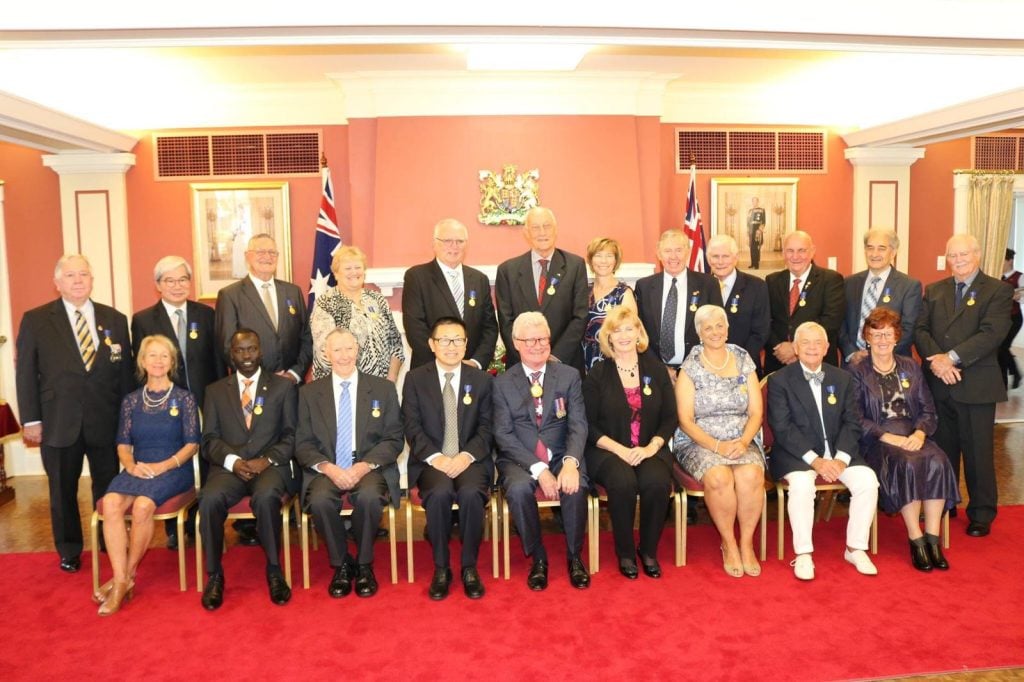
Elijah Buol OAM with other Order of Australia recipients and His Excellency the Honourable Paul de Jersey AC Governor of Queensland at Government House in 2019
What makes you nostalgic and why?
When I was a little boy, my dad would always check my tummy to see if I had eaten enough. If I wanted more food, I would suck my tummy in. Sometimes, he knew I was pretending — it was a game between us, and how we connected. So, when I see young boys with their dads, I think about these moments with my dad.
What is your secret skill?
I have the ability to listen and reflect. My dad was a very tall, cool and collected man — he modelled being calm and never being upset about things you do not have control over.
What day would you like to re-live and why?
The day our first son, Deng, was born. The day I became a father!
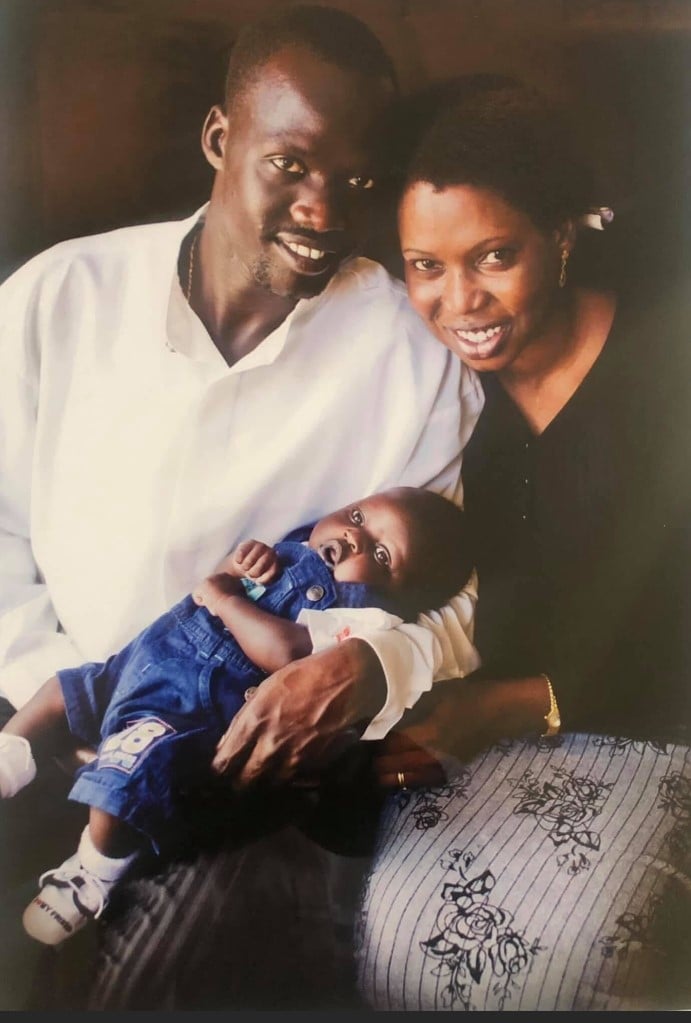
Elijah Buol OAM and wife, Ashol, with first-born son, Deng, at home in 2009
If you could only eat one thing for the rest of your life, what would that be?
In the Ugandan refugee camp, we only had one meal a day — maize was given to us in our ration packs, along with dry beans, salt and oil. Let’s just say, I am reluctant to eat beans now.
If I could only eat one thing for the rest of my days, I would eat porridge and drink milk. I was brought up drinking fresh milk from our cows, which are very important in my culture.
What item should you throw out, but can’t bear to part with?
I came to Australia with very little. An item I can’t throw away is my first high school sport award trophy.
What’s your unanswerable question — the question you are always asking yourself?
“When God calls me to leave this world, what impact will I have made?” This is the question I ask myself every day. So let’s us share the joy of Christmas with others and take that action through the Christmas Bowl.
Editor’s note: Priests and parish councils can register their parish’s participation in the Christmas Bowl appeal and access resources and order (optional) envelopes by registering on the Act for Peace website. Individual community members may donate to the Christmas Bowl appeal via the Act for Peace website.

